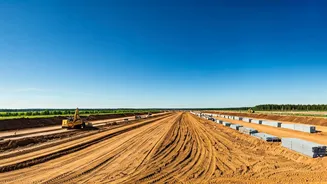Strategic Asset Acquisition
The Adani Group's interest in acquiring assets from Sahara signifies a calculated strategic move to bolster its land reserves. This initiative is aimed
at building a considerable land bank, which can be utilized to support future infrastructure endeavors and development projects. The move underscores the Adani Group's long-term vision and its intention to strengthen its presence in the real estate sector. By securing these assets, the group positions itself for enhanced expansion and market competitiveness, potentially influencing the trajectory of urban development and property values.
Expanding Real Estate Footprint
The acquisition of numerous Sahara assets would allow the Adani Group to considerably increase its footprint in the real estate sector. The decision points to a focused strategy of broadening its portfolio and creating opportunities for growth. This expansion could involve diverse projects, from commercial complexes to residential developments, depending on the assets acquired. With a larger land bank, the group would gain greater flexibility in implementing strategic projects and adapting to market demands. This approach reflects the Adani Group's commitment to diversification and its ambitious goals for the future.
Infrastructure and Development Plans
The acquired land bank is expected to play a critical role in the Adani Group's infrastructure and development projects. By integrating these assets into its portfolio, the group can expedite project timelines and maximize control over development processes. The properties could be strategically deployed to create new urban centers, logistics hubs, or renewable energy facilities. This approach provides the group with a competitive advantage, and it supports its broader goals to contribute to India's economic growth, while demonstrating a commitment to sustainable urban development. The Adani Group is positioning itself as a key player in shaping the future of India's real estate landscape.
Sahara Assets at Stake
The transaction includes a multitude of assets previously held by Sahara. The variety of these assets could range from underdeveloped land parcels to existing properties, which offers the Adani Group numerous options for deployment. Assessing the precise portfolio of assets and the terms of any agreements is crucial to fully understanding the implications of this deal. Furthermore, the successful integration of these assets into the Adani Group's existing portfolio would be essential for the successful implementation of its future plans and objectives. This transaction could trigger considerable shifts in the real estate market, thus reshaping India's growth path.












